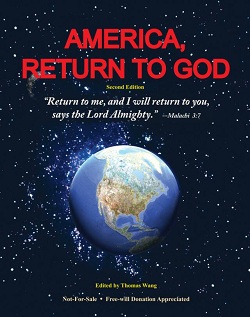
 捐助 Donate
捐助 Donate
America Return to God Prayer Movement
Home ![]() Literature
Literature ![]() When The Foundations Are Destroyed
When The Foundations Are Destroyed
When The Foundations Are Destroyed
--From Book: America, Return to God
 By Gene Edward Veith, Jr.
By Gene Edward Veith, Jr.
The word of God anticipates the dilemma of our age and for our church in the profound question of Psalm 11:3: "When the foundations are being destroyed, what can the righteous do?" Our whole modern era has been engaged in destroying foundations and in trying to erect some new foundation on the rubble.
Our Lord Himself spoke of foundations: "Everyone who hears these words of mine and puts them into practice is like a wise man who built his house on the rock." He who rejects the foundation of God's word, on the other hand, "is like a foolish man who built his house on sand"(Matthew7:24, 26). Sands, of course, keep shifting. The history of modern thought consists of a succession of foundations - the rationalism of the Enlightenment, the emotionalism of Romanticism, the will-power of Existentialism. In times of crisis, however, when "the rain came down. the streams rose, and the winds blew," each of these humanly built foundations collapses "with a great crash" (Matthew 7:27).
Today we see the rejection of all foundations. The various projects of modernism involved destroying foundations and replacing them with foundations of a different kind. Today the modern has become obsolete, and the futility of this never-ending cycle of demolition and reconstruction has become evident. The postmodernists pose a completely different alternative. Perhaps we can build without foundations.
WHAT CAN THE RIGHTEOUS DO?
But “when the foundations are being destroyed" - all foundations - "what can the righteous do?" How can the church that claims to have one exclusive foundation function in an age in which all foundations are being trashed? In the past people argued about what is right and what is wrong, what is true and what is false. Today people dismiss the very concepts of morality and truth. How can Christians promote" righteousness in such an age?
Christians testify to the truth of Christ? How can they proclaim the gospel to people who deny that they are sinners and who think that everybody is saved?
The temptation, though, is to change the character and the teaching of the church in order to be more popular with potential members. The desire to be a “mega church" often leads to "mega shift" theology. Changes in style tend, often inadvertently, to produce changes in content.
Revising worship services to make them more emotional and entertaining can only teach the congregation subjectivity and spiritual hedonism.
"Do not conform any longer to the pattern of this world," writes the Apostle "but be transformed by the renewing of your mind" (Romans 12:2). This text alone is enough to shoot down the argument that the church must change according to prevailing social trends' "The pattern of this world" is not to determine church ministry. This rules out every kind of syncretism, liberalism, and "mega-shift" theology. Rather, Christians are to "be transformed" by the Holy Spirit and their minds are to be renewed by the Word of God.
In particular, the church must stand firm on the two foundational concepts now under attack: morality and truth.
"The ultimate proof of the sinner,' said Luther, "is that he doesn't know his own sin. Our job is to make him see it.', proclaiming God's Law can bring conviction of sin; at that point, our job is to proclaim the gospel of salvation in Jesus Christ.
THE LESSONS OF HISTORY
Destroying the foundation is not a new idea. The question raised in psalm 11 has applied to God's people throughout the ages. When the children of Israel came into the promised land, they conformed to the behavior patterns of the Canaanites to the extent of sacrificing their own children (Jeremiah 7). God’s judgment was severe. Yet God remained with His people in their exile and brought them back together. Again they would be sorely tried by their surrounding cultures, by the Greek empires, by the Romans.
The church, however, did not try to conform to the pattern of the world. It refused to compromise its principles. Far from being popular and socially acceptable, Christianity was despised. Thousands of Christians were martyred. Nevertheless, the Holy Spirit kept bringing people to Christ. Eventually the whole Roman Empire in all of its power and glory bowed before the lordship of Christ.
Throughout its history the church has always had two options - to go along with the times or to counter them. One could argue that the most vital theological movements in church history have been those which went against the trends of their time.
During the Enlightenment of the eighteenth century many in the church decided to go along the Age of Reason. They jettisoned belief in miracles and the supernatural and reinterpreted Christianity in rationalistic terms. This was the first version of liberal Christianity. And yet the eighteenth century was also marked by a religious movement that went against its times. The Methodist movement in the English-speaking world and the Pietist movement within Lutheranism countered Enlightenment rationalism with a supernatural, emotional spirituality. In America the Age of Reason was accompanied by the Great Awakening.
Many in the nineteenth century reacted against Enlightenment rationalism in favor of the emotionalism, subjectivity, and self-exploration of romanticism. This movement spawned a different theological liberalism, a debased form of pietism which presented Christianity as nothing more than a set of feelings. And yet nineteenth-century romanticism was countered by theological movements that went squarely against the spirit of the age.
Twentieth-century existentialism inspired yet another brand of liberal theology, draining Christianity of its objective content. Yet the most flourishing religious movements of the twentieth century have challenged the assumptions of the times.
In America modernism was countered by fundamentalism. Evangelicals have stressed the proclamation of the gospel and upheld the authority of the Bible.
The confessional churches survived the church struggle of Hitler's Germany, Polish Catholicism undermined communism, and Eastern Orthodoxy outlasted Soviet rule.
For those who eventually brought down the monolith of communism, ending the modern era, the issue was always "truth."
Such an emphasis on truth and such moral heroism must ring hollow to the postmodern relativists in the West. In fact, when Solzhenitsyn gave the commencement address at Harvard in 1978, he began by invoking Harvard's motto "Veritas" (Latin for "truth"). His speech excoriated the West's immorality, materialism, and godlessness. It ruffled the feathers of the intellectual establishment, provoking outrage among the academics and sparking indignant editorials in the liberal media.
Solzhenitsyn's address raises postmodern issues in a distinctly Christian way. Its very title alludes to the postmodern condition: "A World Split Apart." He affirms traditional cultures against the all-encompassing mass culture of Western secularism. He dissects the West's materialism and concern for comfort and pleasure, which has drained away our capacity for courage and sacrifice. He deplores the way our laws have been divorced from morality. "Society has turned out to have scarce defense against the abyss of human decadence, for example against the misuse of liberty for moral violence against young people, such as motion pictures full of pornography, crime, and horror." He blasts the irresponsibility of the news media and the West's "TV stupor." "Your scholars are free in the legal sense," he observes", but they are hemmed in by the idols of the prevailing fad." He attacks "humanism which has lost its Christian heritage" and cites the obsolescence of the "ossified formulas of the Enlightenment."
At the heart of his analysis is worldview criticism and a Christian view of history:
... we have lost the concept of a Supreme Complete Entity which used to restrain our passions and our irresponsibility.
We have placed too much hope in politics and social reforms, only to find out that we were being deprived of our most precious possession: our spiritual life. It is trampled by the party mob in the East, by the commercial one in the West.
Solzhenitsyn, like the post modernists, believes that the modern era is over and that we are on the threshold of something new:
If the world has not approached it send, it has reached a major watershed in history ...It will demand from us a spiritual blaze; we shall have to rise to a new height of vision, to a new level of life, where our physical nature will not be cursed, as in the Middle Ages, but even more importantly, our spiritual being will not be trampled upon, as in the Modern Era.
Despite his devastating critique of both the East and the West, Solzhenitsyn is not pessimistic. He ends: “No one on earth has any other way left but -upward." He challenges us to begin “a spiritual blaze."
THE LORD IS IN HTS HOLY TEMPLE
"When the foundations are being destroyed, what can the righteous do?” The psalm goes on to give the answer, shifting the issue away from what human beings can do, to a confession of faith: “The LORD is in his holy temple; the LORD is on his heavenly throne" (psalm I l:4).
Human beings may destroy foundations, but that has no effect whatsoever on the sovereignty of God. He rules. He transcendently and objectively reigns in Heaven. Furthermore, He is present not only in Heaven, but on earth. He is not only on His heavenly throne; He is in His holy Temple -that is, in His Church. No matter what the culture does, the children of God have this absolute security, that God is in control and that He is present with them.
When the foundations are destroyed, God's people can expect to be targeted. "For look, the wicked bend their bows; they set their arrows against the strings to shoot from the shadows at the upright in heart" (Psalm 11:2). That the enemies of the faith are shooting “from the shadows" suggests the subtlety of the attacks.
But instead of running away and hiding, instead of "flee(ing) like a bird to your mountain," the believer relies on u foundation that will never be shaken: “In the LORD I take refuge" (psalm 11:1). With this knowledge, Christians can agree with the post modernists on the transience of human knowledge, culture, and history. "Jesus Christ, on the other hand, "is the same yesterday and today and forever" (Hebrews l3:8)
All men are like grass, and all their glory is like the flowers of the field; the grass withers and the flowers fall, but the word of the Lord stands forever (l peter l:24-25)
(From Postmodern Times by Gene Edward Veith, copyright 1994, pages225-234. Used by permission of Crossway Books, a ministry of Good News Publishers, Wheaton, Il 60187, www.crossway.com)
Home ![]() Literature
Literature ![]() When The Foundations Are Destroyed
When The Foundations Are Destroyed